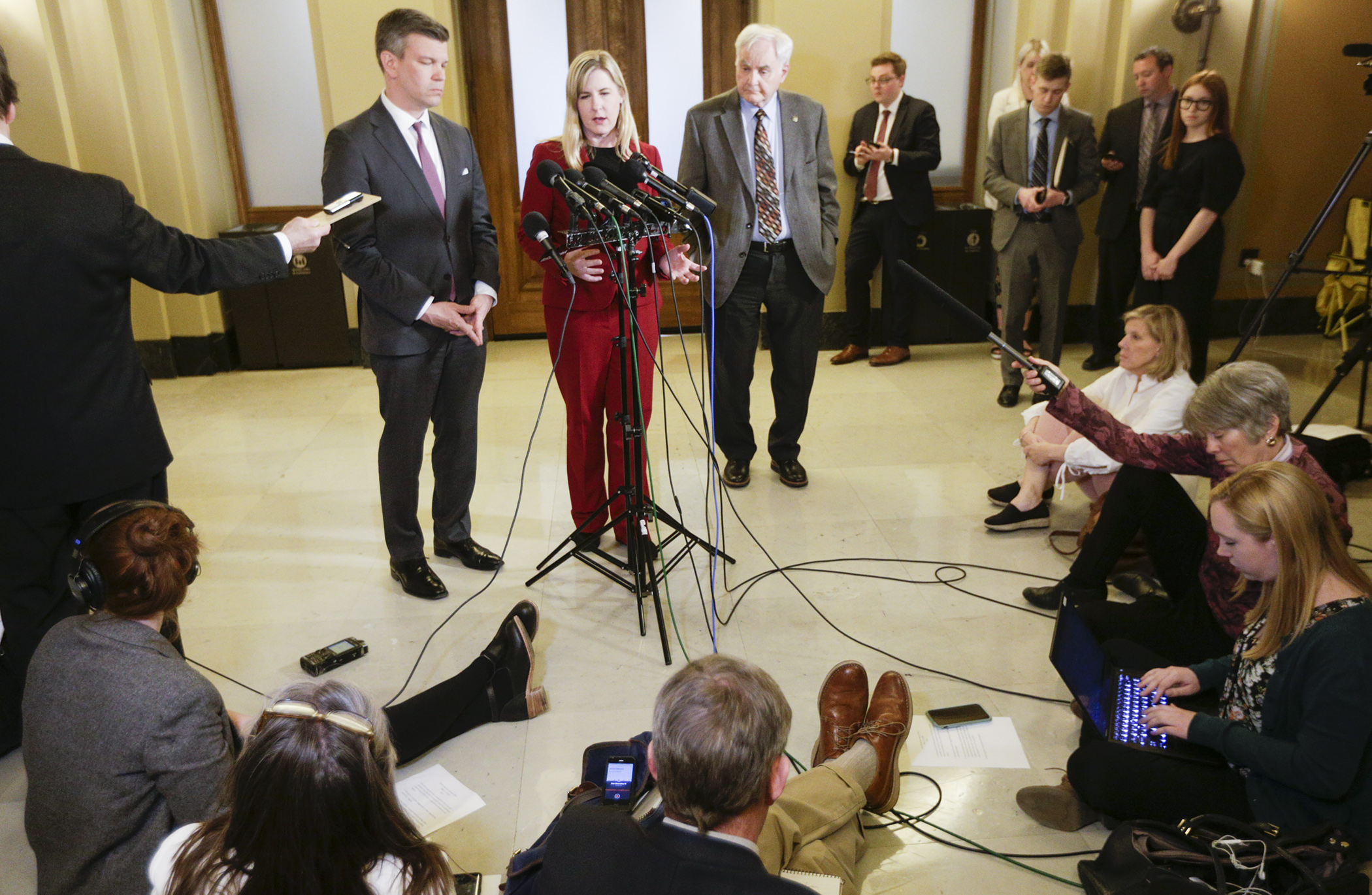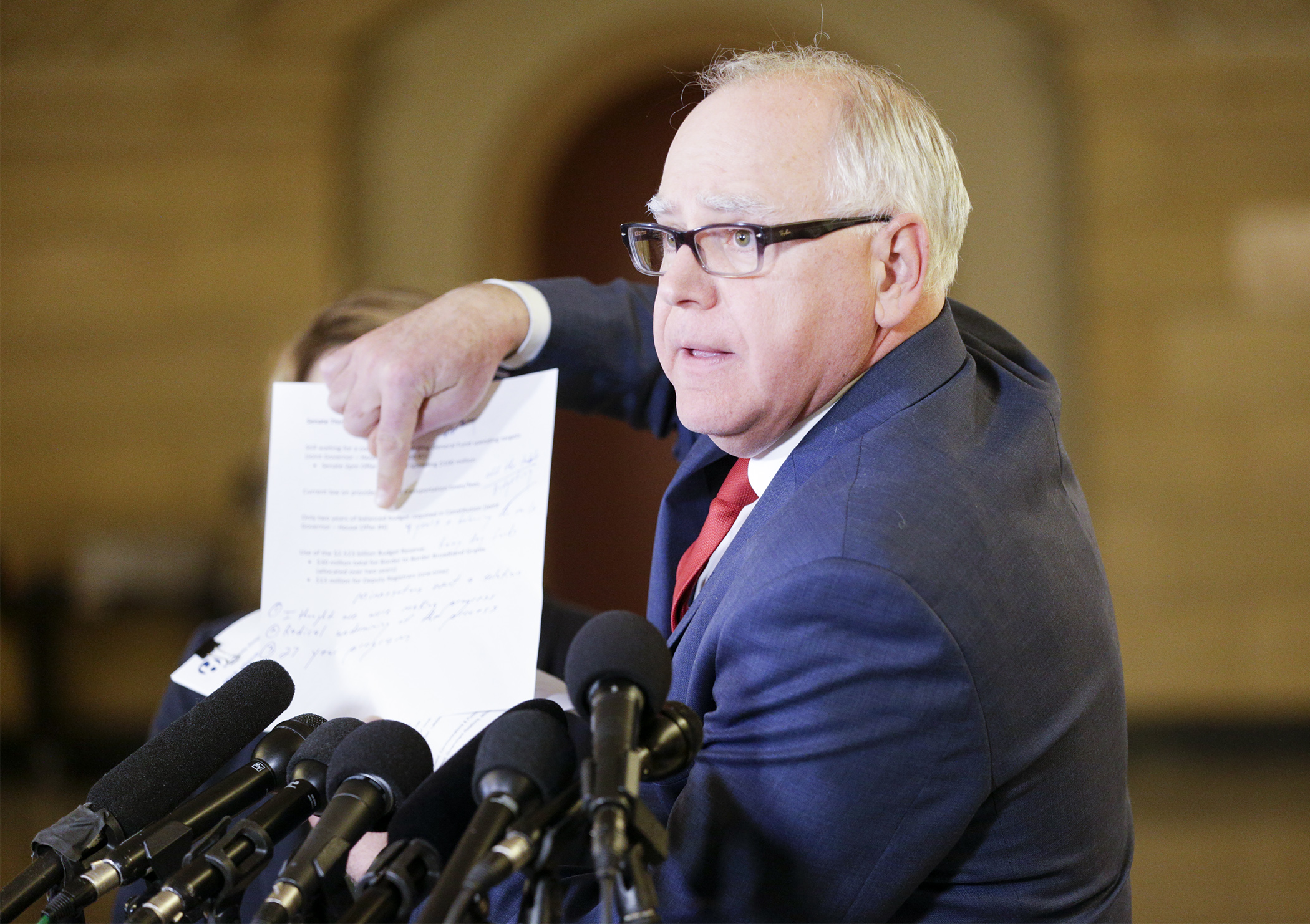Republicans, DFL make counteroffers but budget negotiations stall

Updated 8:42 p.m. — Budget talks that began on a promising note Monday afternoon came to an abrupt halt as House DFL leaders and Gov. Tim Walz expressed disappointment and frustration at an offer from Senate Republicans they said was fiscally irresponsible and could put Minnesota’s most vulnerable citizens at risk.
After trading offers throughout the afternoon, in which the Republicans offered $100 million more in ongoing spending for education and public safety and Walz offered a 4 cents per-gallon reduction in his gas tax proposal, the sides met again at dinnertime.
The Republicans reiterated their earlier offer of $75 million in E-12 education spending, and $25 million for public safety and judiciary, along with use of the $2.52 billion budget reserve fund to provide $30 million in broadband grants and $13 million to help deputy registrars.
 Frustration growing, Gov. Tim Walz said he was disappointed by the latest offer made by Senate Republicans as he spoke to the media after budget talks appeared to fall apart early Monday evening. Photo by Paul Battaglia
Frustration growing, Gov. Tim Walz said he was disappointed by the latest offer made by Senate Republicans as he spoke to the media after budget talks appeared to fall apart early Monday evening. Photo by Paul BattagliaBut the offer did not make any movement on new transportation revenue, it agreed to “only two years of [a] balanced budget” and it restated the Republican stance that the 2 percent health care provider tax be allowed to expire. The tax generates $700 million annually for health care and other services.
That drew a sharp response from House Speaker Melissa Hortman (DFL-Brooklyn Park) who said the conversation had moved in a “very disappointing direction” after what she thought had been “good faith” negotiations.
“We moved nearly a billion dollars toward their position and they just moved more than a billion dollars away from us,” Hortman said at an evening press conference. She said cutting funding for education and health care were “red lines” for the DFL and not balancing future budgets was a “Trump-style of budgeting.”
Senate Majority Leader Paul Gazelka (R-Nisswa) said the state’s budget reserve is as large as it has ever been and using some of that money is appropriate given last year’s vetoed omnibus bill left “a lot of unfinished business” that hadn’t been funded then. He also noted the state’s most recent revenue report which showed state collections were nearly $500 million more than expected in April.
“We already have large resources that we can use, we have a billion dollars in surplus, the latest numbers in April came out, $489 million of new money that we’re not even counting,” Gazelka said. He went on to add that DFL leaders were mistaken if they thought renewing the health care provider tax had been on the table for negotiations.
That seemed to be news to Walz, who expressed disappointment at the turn negotiations had taken.
“I truly thought we were making progress,” Walz said, then stood and periodically shook his head while Minnesota Management and Budget Commissioner Myron Frans explained why he believes using the budget reserve is fiscally irresponsible.
Walz said he wanted to figure out a way to get Republicans to return to the table for a “serious conversation.”
For his part, Gazelka said the two sides were “worlds apart” but also expressed a desire to keep talking.
Per the constitution, the legislative session must end by May 20.
Earlier in the day
Monday began on a positive note with Senate Republicans putting forth an offer of increased spending for education and public safety and DFL leaders countering with a proposal.
“We want to get the ball rolling so we made an offer that we think gets us there,” Gazelka said. “There are no tax increases in this offer in any way. But that will be the conversation for a later day.”
Walz called the offer “positive news” and said after “months of posturing” the Senate realized it had “grossly underfunded education and public safety.” He said Republicans would pay for the increase with a “raid” on the Health Care Access Fund and challenged them to have “an honest conversation” about education funding.
But Hortman wasn’t as kind in her assessment.
“The Senate’s offer is woefully in adequate. It continues to pit elderly and disabled Minnesotans and their health care against the schoolchildren of the State of Minnesota. It does not honestly acknowledge the needs of the state.”
A 4 p.m. counteroffer from Walz and the House DFL, in part, agreed with the Senate suggestion to start negotiating spending targets. It also dropped the proposed 20-cent-per-gallon gas tax increase to 16 cents.
However, Gazelka reiterated his position of no gas tax increase saying that existing revenues can fund state transportation needs.
The DLF offer also noted the Senate proposal “makes obvious that the 2 percent provider tax must be continued” to pay for the access fund deficit. DFLers say this is non-negotiable. Walz said it was optimistic to believe a deal could be completed Monday.
“It's time for Governor Walz and Democrats to take their extreme $12 billion in tax increases off the table, and get serious about reaching a compromise budget that respects Minnesota taxpayers,” House Minority Leader Kurt Daudt (R-Crown) said in a statement. “There is no excuse to be raising $12 billion in taxes when Minnesota has a budget surplus and revenues continue to grow.
Related Articles
Search Session Daily
Advanced Search OptionsPriority Dailies
Ways and Means Committee OKs proposed $512 million supplemental budget on party-line vote
By Mike Cook Meeting more needs or fiscal irresponsibility is one way to sum up the differences among the two parties on a supplemental spending package a year after a $72 billion state budg...
Meeting more needs or fiscal irresponsibility is one way to sum up the differences among the two parties on a supplemental spending package a year after a $72 billion state budg...
Minnesota’s projected budget surplus balloons to $3.7 billion, but fiscal pressure still looms
By Rob Hubbard Just as Minnesota has experienced a warmer winter than usual, so has the state’s budget outlook warmed over the past few months.
On Thursday, Minnesota Management and Budget...
Just as Minnesota has experienced a warmer winter than usual, so has the state’s budget outlook warmed over the past few months.
On Thursday, Minnesota Management and Budget...